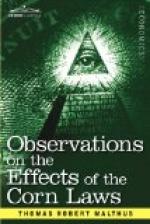These regulations would be extremely simple and obvious in their operations, would give greater certainty to the foreign grower, afford a profitable tax to the government, and would be less affected even by the expected improvement of the currency, than high importation prices founded upon any past average.(5*)
Notes:
1. From the reign of Edward III to the reign of Henry VII, a day’s earnings, in corn, rose from a pack to near half a bushel, and from Henry VII to the end of Elizabeth, it fell from near half a bushel to little more than half a peck.
2. Wealth of Nations, b. iv, c. 2, p. 202.
3. The cheapness of corn, during the first half of the last century, was rather oddly mistaken by Dr. Smith for a rise in the value of silver. That it was owing to peculiar abundance was obvious, from all other commodities rising instead of falling.
4. The sudden fall of the price of corn this year seems to be a case precisely to point. It should be recollected however that quantity always in some degree balances cheapness.
5. Since sending the above to the press I have heard of the new resolutions that are to be proposed. The machinery seems to be a little complicated, but if it will work easily and well, they are greatly preferable to those which were suggested last year.
To the free exportation asked, no rational objection can of course be made, though its efficiency in the present state of things may be doubted. With regard to the duties, if any be imposed, there must always be a queston of degree. The principal objection which I see to the present scale, is that with an average price of corn in the actual state of the currency, there will be a pretty strong competition of foreign grain; whereas with an average price on the restoration of the currency, foreign competition will be absolutely and entirely excluded.
[Transcriber’s note: The sentence
It is alleged, first, that security is of still more importance than wealth, and that a great country likely to excite the jealousy of others, if it become dependent for the support of any considerable portion of people upon foreign corn, exposes itself to the risk of having its most essential supplies suddenly fail at the time of its greatest need.
originally read:
It is alleged, first, that security is of still more importance than wealth, and that a great country likely to excite the jealousy of others, if its it become dependent for the support of any considerable portion of people upon foreign corn, exposes itself to the risk of having its most essential supplies suddenly fail at the time of its greatest need.
This was probably a printer’s error.]



